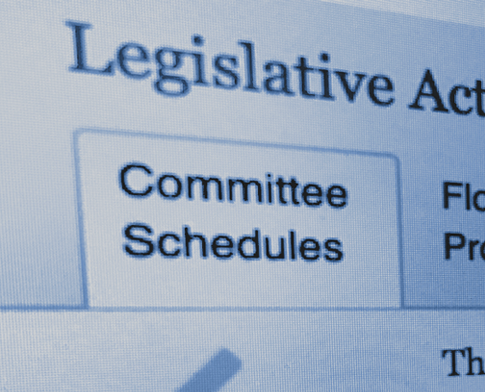Health Update (February 4)
| The longest government shutdown in American history ended last Friday (1/25) after President Donald Trump signed a 3-week continuing resolution to reopen all closed government agencies. The continuing resolution did not contain any increased appropriations for a southern border wall, but negotiators in the House and Senate are working to present a long-term spending solution by the new government funding deadline of February 15th. Speaker Nancy Pelosi (D-CA) has maintained that no House package will contain money for a border wall, but many Democrats have indicated a willingness to allocate money for increased security and technology at ports of entry.
The State of the Union address, which was originally scheduled to occur this week, was delayed due to the government shutdown. After the shutdown ended, Speaker Pelosi re-invited President Trump to address both chambers of Congress. The President will address a joint session of Congress on the evening of Tuesday, February 5th.
Drug Pricing
The Senate Committee on Finance met this week to discuss concerns regarding the rising cost of prescription drugs in America. Some senators questioned why U.S. citizens pay more for medication than they would in other nations, to which one of the panelists argued that the U.S. spends more in research and has more exclusive pharmaceuticals. The panelists generally agreed that the current Medicare program is not functioning as it is intended. The committee spent much time discussing how patients do not see enough benefit from the current rebate program. Some suggested the same for Medicaid and the 340B program. Panelists agreed that there should be a more effective way to determine the introductory cost of sole-source drugs without competition in order to prevent inflationary prices. In addition, they discussed ideas for how to increase competition in the drug market. Finance Committee Chairman Chuck Grassley (R-IA) lamented the absence of pharmaceutical manufacturers at the day’s hearing, saying, “It is disappointing that so many companies have refused to come before the committee to discuss pharmaceutical prices. This lack of cooperation speaks to a lack of transparency in the pharmaceutical industry.” For a full readout of the Finance Committee’s discussion, click here.
The House Oversight and Reform Committee held its first meeting this week, and Chairman Elijah Cummings (D-MD) chose to focus on prescription drug pricing as well. The personal story of a woman who lost her child due to insulin rationing made an impact on all committee members, and Chairman Cummings said that this story was representative of thousands of patients who are forced to make such difficult choices. Topics of frequent discussion were the role of PBMs in formulary management, the lack of Medicare’s ability to negotiate drug prices, and the exclusivity period for new drugs. While no specific legislation was discussed, there does seem to be a strong bipartisan appetite to address rising prices and high launch prices. It seems likely that the next steps taken by committee members will be to question drug companies directly on how they can justify price increases and high launch prices. The exclusivity period for drugs will be relevant in the upcoming discussion of the US-Mexico-Canada trade agreement negotiations and ratification by Congress. For full coverage of this hearing, please click here.
Department of Health and Human Services (HHS) continued its effort to address high drug prices by releasing a proposed rule yesterday that would mandate that any pharmaceutical rebates are passed through directly to consumers in Medicare and Medicaid health plans. HHS Secretary Alex Azar called on Congress to go further to pass a ban on rebates to pharmacy benefits managers (PBMs) and deliver the rebates directly to consumers for those in private insurance. Under the Trump administration proposal, PBMs would receive a flat fee for including drugs on their formularies. Secretary Azar said, “Congress has an opportunity to follow through on their calls for transparency by passing our proposal into law immediately and extending it to the commercial drug market.”[1] Democrats quickly blasted the proposal, saying that it was misguided and would result in higher premiums for beneficiaries.
In an effort to boost generic competition, the Food and Drug Administration issued draft guidance that will require drug makers to advertise if their approved drugs are on the market. The FDA Reauthorization Act of 2017 added new requirements for marketing status, including a notification of withdrawal from sale, notification of drugs not available for sale, and a one-time reporting on marketing status if active drugs were withdrawn from sale or were never available for sale. The full draft guidance document can be found here.
Affordable Care Act
The Ways and Means Committee held a hearing on Wednesday to discuss protections for Americans with pre-existing conditions. While no member disagreed about the need to protect Americans with pre-existing conditions, the disagreement came when discussing the underlying issue of the Affordable Care Act, which federally guaranteed those protections. Republican members on the committee highlighted the rising costs of health care premiums while Democratic members criticized actions taken by past congresses and particularly the Trump administration, such as ending cost-sharing reduction payments, the removal of the individual mandate in the Tax Cuts and Jobs Act, and reducing funding for ACA Navigators. Some Republicans touted their support for the American Health Care Act, which was the Republican alternative to the Affordable Care Act. One specific legislative proposal was discussed by Rep. Brian Higgins, which would allow people as young as 50 to buy in to Medicare. To read key questions and comments from this hearing, click here.
The House Education and Labor Committee will also hold a hearing in the coming weeks to discuss the protections for pre-existing conditions. Chairman Bobby Scott (D-VA) said this week that one of the committee’s first four hearings will focus on pre-existing conditions. A specific date for that hearing has not been set.
2020 Medicare Advantage and Part D Advance Notice
The Centers for Medicare and Medicaid Services has released Part II of the Advance Notice of changes to Medicare Advantage capitation rates and Part D payment policies. Comments will be accepted by CMS through March 1, 2019, and the final Rate Announcement and Call Letter will be published on April 1, 2019.[2] To view a fact sheet from CMS, click here. To read the full advance notice and draft call letter, click here.
Stark Law Reform
Efforts to reform Stark Law and enact anti-kickback regulations at HHS are being described as a “sprint.” Deputy Secretary Eric Hargan is working to issue a proposed rule on Stark Law and an anti-kickback statute later this year. On Wednesday, Assistant Secretary Hargan said the rulemaking would be conducted in two rounds. He said, “Right now we’re currently in the fermenting stage of the development of the rule, but we’re very far along.” While the two notices for proposed rules will probably come separately, it is likely that HHS will coordinate so the notices are released close together.[3]
Community Health Centers
The Senate Committee on Health, Education, Labor, & Pensions met to discuss congressional extension of funding for health centers, including several different teaching programs and loan forgiveness programs. In 2017, Congress failed to renew funding for these programs, leaving them without federal financial support for four months. Four panelists urged the committee to avoid causing the same problem again this year and to pass a bill funding these programs for a longer term of 5 years. The committee members and the panelists agreed that the stability granted by such funding would allow these health centers to plan for the future and to run more effective teaching programs. In addition, the committee was interested in the impact that these health centers can have on the opioid epidemic as well as national healthcare expenditures. For more on this hearing, please click here.
References [1] Berkeley Lovelace Jr. and Bertha Coombs. “Trump administration pressures Congress to lower Medicare drug prices by ending industry’s backdoor deals.” CNBC, 1 Feb 2019. https://www.cnbc.com/2019/02/01/trump-urges-congress-to-pass-new-drug-plan-extend-to-private-market.html [2] “2020 Medicare Advantage and Part D Advance Notice Part II and Draft Call Letter.” Centers for Medicare and Medicaid Services, 30 Jan 2019. https://www.cms.gov/newsroom/fact-sheets/2020-medicare-advantage-and-part-d-advance-notice-part-ii-and-draft-call-letter [3] Susannah Luthi. “Stark, anti-kickback rulemaking underway at HHS.” Modern Healthcare, 30 Jan 2019. https://www.modernhealthcare.com/article/20190130/NEWS/190139994 |
HOUSE.GOV
The Week Ahead
For the main events of the next week and more, go straight to the key events on the house.gov website.
SENATE.GOV
The Week Ahead
For the main events of the next week and more, go straight to the key events on the senate.gov website.


